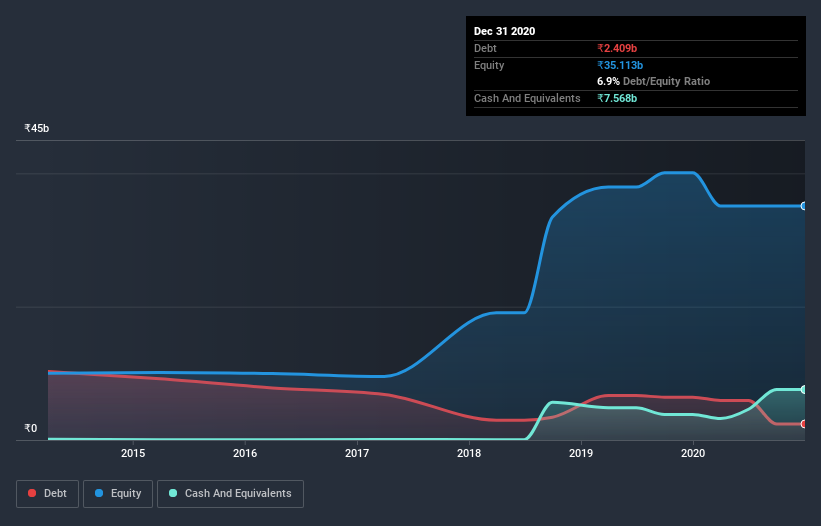
David Iben put it well when he said, 'Volatility is not a risk we care about. What we care about is avoiding the permanent loss of capital.' When we think about how risky a company is, we always like to look at its use of debt, since debt overload can lead to ruin. Importantly, HEG Limited (NSE:HEG) does carry debt. But the more important question is: how much risk is that debt creating?
When Is Debt Dangerous?
Debt assists a business until the business has trouble paying it off, either with new capital or with free cash flow. Part and parcel of capitalism is the process of 'creative destruction' where failed businesses are mercilessly liquidated by their bankers. While that is not too common, we often do see indebted companies permanently diluting shareholders because lenders force them to raise capital at a distressed price. Having said that, the most common situation is where a company manages its debt reasonably well - and to its own advantage. The first step when considering a company's debt levels is to consider its cash and debt together.
See our latest analysis for HEG
What Is HEG's Net Debt?
You can click the graphic below for the historical numbers, but it shows that HEG had ₹2.39b of debt in September 2020, down from ₹6.42b, one year before. However, its balance sheet shows it holds ₹7.57b in cash, so it actually has ₹5.18b net cash.

How Strong Is HEG's Balance Sheet?
We can see from the most recent balance sheet that HEG had liabilities of ₹4.71b falling due within a year, and liabilities of ₹969.1m due beyond that. Offsetting this, it had ₹7.57b in cash and ₹2.62b in receivables that were due within 12 months. So it actually has ₹4.51b more liquid assets than total liabilities.
This short term liquidity is a sign that HEG could probably pay off its debt with ease, as its balance sheet is far from stretched. Succinctly put, HEG boasts net cash, so it's fair to say it does not have a heavy debt load! There's no doubt that we learn most about debt from the balance sheet. But you can't view debt in total isolation; since HEG will need earnings to service that debt. So when considering debt, it's definitely worth looking at the earnings trend. Click here for an interactive snapshot.
In the last year HEG had a loss before interest and tax, and actually shrunk its revenue by 60%, to ₹13b. That makes us nervous, to say the least.
So How Risky Is HEG?
Although HEG had an earnings before interest and tax (EBIT) loss over the last twelve months, it generated positive free cash flow of ₹5.9b. So although it is loss-making, it doesn't seem to have too much near-term balance sheet risk, keeping in mind the net cash. With mediocre revenue growth in the last year, we're don't find the investment opportunity particularly compelling. There's no doubt that we learn most about debt from the balance sheet. But ultimately, every company can contain risks that exist outside of the balance sheet. For instance, we've identified 2 warning signs for HEG (1 is significant) you should be aware of.
At the end of the day, it's often better to focus on companies that are free from net debt. You can access our special list of such companies (all with a track record of profit growth). It's free.
If you’re looking to trade HEG, open an account with the lowest-cost* platform trusted by professionals, Interactive Brokers. Their clients from over 200 countries and territories trade stocks, options, futures, forex, bonds and funds worldwide from a single integrated account. Promoted
Valuation is complex, but we're here to simplify it.
Discover if HEG might be undervalued or overvalued with our detailed analysis, featuring fair value estimates, potential risks, dividends, insider trades, and its financial condition.
Access Free AnalysisThis article by Simply Wall St is general in nature. It does not constitute a recommendation to buy or sell any stock, and does not take account of your objectives, or your financial situation. We aim to bring you long-term focused analysis driven by fundamental data. Note that our analysis may not factor in the latest price-sensitive company announcements or qualitative material. Simply Wall St has no position in any stocks mentioned.
*Interactive Brokers Rated Lowest Cost Broker by StockBrokers.com Annual Online Review 2020
Have feedback on this article? Concerned about the content? Get in touch with us directly. Alternatively, email editorial-team (at) simplywallst.com.
About NSEI:HEG
HEG
Manufactures and sells graphite electrodes in India and internationally.
Flawless balance sheet with high growth potential.
Similar Companies
Market Insights
Community Narratives



